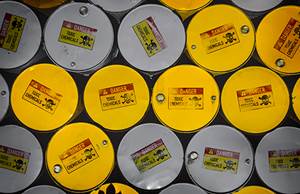IMTS Cleaning Exhibits Emphasize Trends
This year, some parts cleaning exhibitors say the biggest trends they are experiencing include more automated equipment, the need for precision cleaning for smaller particle counts than in the past and growing demands for using more green and neutral-based cleaners.
Like other technologies found at IMTS, parts cleaning technologies are constantly evolving. This year, some parts cleaning exhibitors say the biggest trends they are experiencing include more automated equipment, the need for precision cleaning for smaller particle counts than in the past and growing demands for using more green and neutral-based cleaners.
Dave Melton, marketing manager, Cleaning Technologies Group (booth 121513), says he has seen cleaning equipment change drastically over the past few years. “Cleaning machines have adapted automation, combined technologies and include more sophisticated filtration systems to help address more critical areas,” he says. Cleaning Technologies Group’s Aquarius Series multi-tank ultrasonic cleaning systems, for example, combine ultrasonic cleaning with rinsing, drying and other processing steps into one unit. The system also has an automated, robotic transfer, environmental enclosure and a DI water system.
Kyzen’s chemistry for vacuum degreasers meet customers’ needs as well as a safe and environmentally acceptable alternative to available solvents. New vacuum degreasers in the market provide parts cleaning in an enclosed vessel that reduces fugitive emissions from the system while isolating the operator from the process. “The preferred solvents are modified alcohols or hydrocarbon products that are environmentally preferred over traditional solvents,” says Joe McChesney, global product line manager, solvents at KYZEN (booth 121033). Kyzen also offers a range of aqueous solutions as well as an extensive line of corrosion preventatives.
Also, vacuum degreasers offer rotation, ultrasonics, multi-stage immersion flood cycles, spray-in-air, vapor only, and drying all in one chamber.
Not only are parts cleaning machines and chemistries expected to be environmentally friendly, but parts assembly areas are as well, according to Peter Feamster, product management director, Jomesa North America Inc.(booth 121322). Jomesa’s microscopic filter analysis systems look for particles on critical parts. “Fibers present on the filters cause problems with the results; fibers are not considered ‘critical’ particles and therefore are disregarded from the specification,” Mr. Feamster says. “However, they overlap critical particles and cause measurement errors and longer processing time. So, the more control over the airborne particles that you have, the less ‘noise’ you will have to sift through on your filter analysis.” He says fibers come from a number of sources, but mostly they are from the cleanliness testing personnel’s clothing or the analysis environment in general. The company’s new PSE (precision scan for elements) system is one of the systems on display in Jomesa’s booth. This system is designed to share a database with the company’s optical HFD system in order to quickly locate and analyze particles identified with the HFD system. “The PSE communicates the ‘interesting’ particle coordinates to the system and performs a detailed analysis only on these particles,” Mr. Feamster says. “This saves hours of wait time and achieves the desired analysis.”
Frank Pedeflous, president of Omegasonics (booth 121150), believes that the biggest trend currently in the parts cleaning sector is the demand for more thorough cleaning. “Components throughout most industries are getting smaller and requiring precision cleaning to a smaller particle count,” he says. Omegasonics is displaying its Viking line of multi-stage ultrasonic cleaning stations in its booth that are designed for manufacturers who require components to undergo rigorous cleaning. These cleaning stations are especially useful for precision parts since they use multiple washes and rinses and high efficiency parts drying.
Related Content
Parts Cleaning Sector Shifts Energy Toward Regulatory Changes
With changes in EPA regulations regarding the use of some popular cleaning fluids, cleaning suppliers and end users are readjusting business strategies and/or cleaning processes to meet new requirements.
Read MoreIndustrial Cleaning Shop Zeros In on Precision
This parts cleaning company is elevating its efforts to become a technical cleanliness expert, which presents an exciting, yet sometimes arduous, journey. The ongoing education of the team as well as significant investments in equipment and processes attribute to this shop’s success.
Read MoreMeeting Stringent Cleaning Goals With Modular Ultrasonic System
A knee implant manufacturer implements an advanced cleaning system that meets its tight cleaning requirements, including documenting, validating and tracing the entire cleaning process.
Read More3 Common Filtration Questions Answered
Learn about the variety of filters for removing particulates from a cleaning fluid, how to determine cleaning fluid life and more.
Read MoreRead Next
A Tooling Workshop Worth a Visit
Marubeni Citizen-Cincom’s tooling and accessory workshop offers a chance to learn more about ancillary devices that can boost machining efficiency and capability.
Read MoreEmerging Leaders Nominations Now Open
Here’s your chance to highlight a young person in your manufacturing business who is on the path to be a future leader moving your company forward.
Read More5 Aspects of PMTS I Appreciate
The three-day edition of the 2025 Precision Machining Technology Show kicks off at the start of April. I’ll be there, and here are some reasons why.
Read More















.jpg;maxWidth=300;quality=90)







